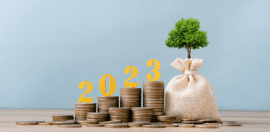The future of impact

28 April 2021 at 3:19 pm
“We’re at a time when we can see that our systems are not serving us. It’s time to explore what systems we need to build a more sustainable way of living in harmony with the planet.”
We’re living through an age of transformation, according to global impact investing leaders who met to discuss the future of impact.
The Future of Impact panel took place as part of Shift 2021, a three-day conference that virtually brought together individuals and organisations in the social and environmental impact space.
For those working to make business a force for good, Shift was an event packed with workshops, speakers and panel-driven conversations.
The Future of Impact panel was made up of Amit Bouri, from Global Impact Investing Network; Cheryl Dorsey, president of Echoing Green; Jed Emerson, impact investment pioneer; and impact investment expert Fran Siegel.
The discussion centred around how we define impact investing, how it’s involved and where it’s going.
Emerson, whose most recent book The Purpose of Capital looks at the “why” behind impact investing, started things off by sharing his definition of the term ‘impact’. He summarised his understanding of impact and how it’s evolved into five points.
- Ignorant impact. The impact we have that we’re largely unaware of. One that we don’t really manage with intentionality and one that creates both a positive or negative value over time.
- Cheap impact. Relative to when people in business talk about how they’re creating jobs and paying taxes, which Emerson thinks of as “the lowest bar of impact”.
- Broad impact. In the context of education initiatives, vaccination initiatives, health care initiatives, and the things that can really affect many lives.
- Deep impact. A function of place where we can position ourselves in ecosystems and communities and really drill down into making change.
- Mutual impact. A process of co-creation, mutual evolution, and the creation of something more positive.
We’re living through an age of transformation
Throughout the hour-long discussion all four panelists talked about the change they felt was happening within the impact investment space, and how transformative action was starting to take shape.
Bouri said while he thought it was a challenging time, there was an opportunity for systems change.
“We’re at a time when we can see that our systems are not serving us. It’s time to explore what systems we need to build a more sustainable way of living in harmony with the planet,” he said.
“People are questioning the fundamental elements of our economic systems and the relationship with humans and other species. It’s an incredibly dynamic time and I’m hopeful that we can build towards a more sustainable system that works for all.”
The role of the pandemic and the Black Lives Matter movement in driving change
When asked how current crises have reinforced thinking about their role and goals within the impact space the panelists, many of whom are based in the US, were quick to respond.
Dorsey from Echoing Green, a global not-for-profit supporting emerging social entrepreneurs, said that she felt we had been in the midst of two different pandemics.
“The global health pandemic unearthed the disproportionate impacts of communities of colour, which have been decimated by COVID-19 and then a pandemic of structural racism and white supremacy,” she said.
“Structural racism was made visible to a lot of folks for the very first time. So, there was a lot of capital pledged and unlocked in this movement, about US$35 billion (A$45 billion) or so pledged by philanthropic and corporate sources.”
Siegel, from the US Impact Alliance, discussed the self-reflection and conversations these crises had brought to her organisation.
“For us, as an organisation these crises really crystallised a dual theory of change, which encompasses confronting the inequality at the community level and the transitioning of our broader economic systems to stakeholder capitalism at the systemic level,” she said.
A global shift from shareholder to stakeholder capitalism
Bouri thinks the impact investment community is still in the process of discovering what stakeholder capitalism actually means.
“It’s a term that’s been adopted and endorsed by the World Economic Forum and the Business Roundtable as well as a lot of activists and advocates who don’t normally find themselves in alignment with the Business Roundtable,” he said.
“There’s a great deal of debate happening around what stakeholder capitalism actually looks like in practice. Our colleagues at B Lab put out a great piece right after the Business Roundtable announcement came out sharing their version of what that looks like from a benefit corporation perspective.”
Future thinking in the impact investing space and the power of social return
When asked about where we go from here, Emerson remarked that he’s been having conversations around the social return of investment since the early 90s. He said he would regularly talk to people who thought they were all promoting very unique and special perspectives on their investing.
“I ended up saying to them – you know, the only thing that matters is your understanding of the nature of the value you’re trying to create through your life’s work through the application of the resources you have access to,” he said.
“Whether you’re an NFP or a for-profit business, it doesn’t matter. Whether you’re making grants or market or concessionary rate capital investments doesn’t matter. The only thing that matters is pursuing clarity around that idea of what’s the nature of the value you seek. And I don’t think that’s anything new.
“We’ve now got more and more capital being deployed with some sort of mission or purpose orientation and that can only be for the good.”
For the impact space to move forward Emerson thinks it’s time to reflect on impact investing’s deeper purpose.
“I spent a lot of 2020 not saying anything because I realised that there was so much in motion and I just had to sit with it all and absorb and understand,” he said.
“At the same time, the answers that are going to bring us forward are not the ones that have brought us to where we are today. We need to be open to that process of co-creation and moving forward and affirming this deeper sense of purpose and meaning.”







